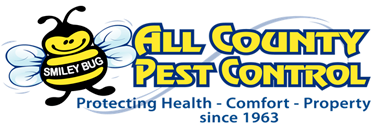Moles are insectivores (they eat insects), and they may control some insect outbreaks. However, mole activity can also cause considerable damage to lawns. This damage is usually in the form of tunnels and/or mounds in lawn that can be unsightly, disturb root systems, and provide cover or travel lanes for other small mammals. All County Pest Control can help you exterminate moles in Lagrangeville, Wingdale, Holmes, Nelsonville, Garrison, Putnam Valley, Yorktown, Purchase, Ardsley, Ryebrook, Mamaroneck and the surrounding areas in Dutchess, Putnam, and Westchester counties.
If you are like most homeowners, you are probably confused by all of the conflicting “advice” on mole control. You may believe that every rumor, home remedy, or control method is worth trying. A common example is when homeowners try to control lawn grubs and insects to reduce mole activity. However, this is often unsuccessful because the mole’s primary food source is earthworms. In fact, many chemicals and home remedies (including castor oil derivatives and grub controls) are not only ineffective when dealing with moles, but they allow the animals time to establish and become real problems. A mole in New York can quickly colonize and spread through adjacent residential properties if not handled properly. Because they need a well-established tunnel network to survive, control will be more difficult the longer they are allowed to tunnel and become habituated.
On large properties mole activity may move from one part of the lawn to another. This movement is affected by climate and ground moisture. Moles will respond to changes in food supply as different insects become available in different places and at different times throughout the year. If disturbed, moles may temporarily leave an area but will usually return when you least expect it. Even without disturbance mole activity may last only a week or two in a particular area. This here-today, gone-tomorrow behavior is probably the root of most of the misconceptions that make some home remedies and pesticides appear credible.
Habitat modification
Over-watering your lawn can bring soil invertebrates and moles closer to the ground surface, making tunnels more visible. Reducing the amount or frequency of watering may help temporarily. Reducing the amount of turfgrass on your property will also reduce the visible signs of damage. In the long run, converting lawn to gardens, paths, hedgerows, or other more natural habitats can save you time and money as well as provide habitat for beneficial birds and butterflies.
Scare tactics and repellents
All County Pest Control prides itself on using the latest technology. Talprid Mole Bait is the only bait proven effective for the treatment of moles. Our service technician will evaluate your lawn and determine treatment sites based on damage and activity.Numerous home remedies have been used, but results are inconsistent and generally ineffective. Remedies such as pickle juice, broken glass, red pepper, razor blades, bleach, moth balls, rose branches, human hair balls, vibrators, ultrasonic devices, castor bean derivatives (castor oil), and explosives may relieve frustrations, but they have little value in controlling moles and may harm you or the environment. Furthermore, certain chemicals or explosives are illegal to use.
Ask about our Home Protection Plan, this is the best protection we can provide to control pests in and around your home. Pests are a constant threat to your home environment and with on-going inspection, treatment and correction of conducive conditions, All County can provide a much better living environment for you and your family.
All County’s exterminators can help you exterminate moles in Putnam County, Westchester County, and Dutchess counties.


